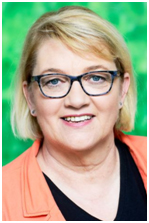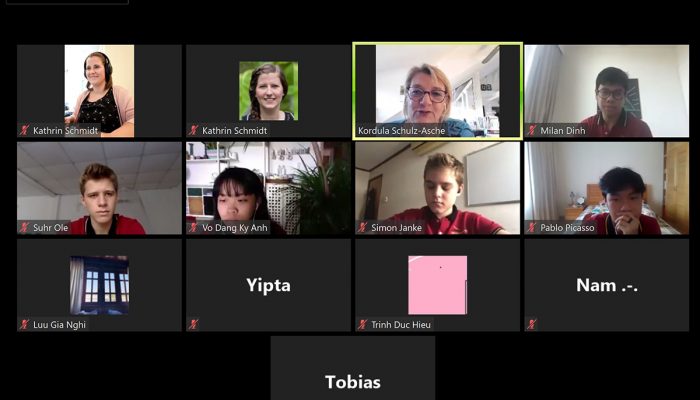Making politics come alive
Interview with Kordula Schulz-Asche, Member of the German Bundestag
What do the students of the IGS and the members of the German Bundestag have in common? They “zoom”!
While the students in Vietnam have had online classes for nine weeks, the German parliament has to find new ways of communicating with its members. A virtue is made of necessity, and thanks to a video conference, the distance from Ho Chi Minh City to Berlin to the German Parliament is reduced to virtually nothing.
As part of the lesson under the direction of the social science teacher Ms. Schmidt, the students in grades 9 and 10 had the opportunity to interview a member of the German Parliament and expert in health and care policy and infectious diseases, Ms. Kordula Schulz-Asche.
After getting to know the parliamentary system of Germany and familiarizing themselves with the functioning of the Bundestag in the past few weeks, the students had prepared specific questions about a career as a member of a parliament, about their everyday work, but also about the current world situation with the Corona Virus.
“Being a politician does not start with being an authority, but with being interested in politics,” said Ms. Schulz-Asche at the beginning of the one-hour-long interview. During her school days she had campaigned in small-scale politics as a student representative in a divided Berlin. “I became interested in the interests of the people around me early on and was not very focused on myself.” Nevertheless, the step to go into politics came a little later: After training as a nurse, studying communication science, and spending many years abroad in Africa as an employee in the field of health education, her path into active politics came in 2003 – first as a member of parliament the Hessian State Parliament and finally in 2013 as a member of the German Bundestag. “As a politician, you need a professional basis, experience and an open ear for people’s problems. As a politician, you should resist the temptation to make yourself dependent on your mandate or position. ” In order to become a good politician who focuses on people’s needs, Ms. Schulz-Asche believes that a good mix of personal opinion is needed, but which is also based on the wishes of the people and is scientifically sound.
During the conversation, the students also learned how busy people are who work in the German Bundestag, and that up to 12 hours of work can be done per day. There is a wild mix of parliamentary group meetings, speeches in the German Bundestag, panel discussions with experts from the health and nursing industry or a visit to a police station or nursing facility in their home town. In addition, the learners learned that it can be difficult – given the global challenges – to switch off as a politician and to live a normal life. “Insults and threats have unfortunately increased. The disadvantages of being a member of Parliament can increase with greater awareness people have of just how accessible you are. ”
However, Ms. Schulz-Asche mostly encounters open, interested people and she still enjoys being able to travel anonymously through the country without being recognized. “I don’t have to be in the front row with federal ministers or parliamentary group leaders. For me it is more important to be connected than to be known. ”
“The most unpleasant thing about politics, however, is redundancy.” For years, an obvious shortage of skilled workers in health care has been noticeable in Germany, and the conditions within the nursing sector, such as poor pay, insufficient work-life balance, and low levels of nursing care for patients are not new, according to the health expert. But the pressing issue has not been tackled extensively for far too long. “The challenges in the health care sector are now more relevant than ever in times of the corona virus. Sometimes it is difficult to endure being ahead of the political process. So it is all the more gratifying that something is happening. ”
In order to curb the corona virus, according to Schulz-Asche, one must act decisively but above all in solidarity. “Not only do certain population groups within Germany need our solidarity, but we also need to foster solidarity with countries where there is no infection protection and health system as extensive as in Germany. Global infection control can only be as good as the weakest link in the chain. ” It is encouraging that financially strong programs for business, research and the social and health sector have already been put in place, but, according to Schulz-Asche, the consequences of the corona pandemic will plague us long after the pandemic is over. The expert has already learned one lesson: “In the future, small-scale production chains will be required, especially for medicines, medical devices and protective clothing; must be able to trust the German location.”
At the end of the intensive conversation, the students were able to discover a completely different facet in Ms. Schulz-Asche than what they had been led by her to expect: “Of course there are still moments when I am excited to speak on a podium – especially when I do not assess the expectations of the audience. But it’s not bad to be excited. A slight basic nervousness is a good companion in everyday political life.”
The students’ reaction promptly followed: “I was surprised by the authenticity and honesty of the member of the parliament ,” Yipta, grade 10, pointed out.
The interview gave the IGS students the opportunity to get a little insight into the life and work of a member of the Bundestag and Ms. Schulz-Asche also liked the exchange, in which she summarized: “I have had a lot of video conferences in the past few weeks in particular, but this was not only the most distant but also the most lively. ”
The students also reflected on the conversation with Schulz-Asche: “The comments on the workload of a politician showed me how stressful the job as a politician can be and encouraged me not to take this path,” said David, class 10.
Simon, grade 9, summed it up personally: “My view of the profession as a politician has changed a lot through interviewing because I didn’t know beforehand that it can actually be pretty easy to become a politician. Ms. Schulz-Asche advised me that if I want to actively go into politics, I should first finish school, do an apprenticeship or study, because with a wealth of experience, politics can be better done for the general public. Maybe the job as a politician is a professional possibility for me. ”
Milan, on the other hand, pointed out that working as a politician would sometimes resemble working as a scientist. As in science, politicians would also work for a long time to create more awareness of their issues, such as Ms. Schulz-Asche’s care and infectious diseases. “Important issues in society are often neglected until they arrive in society with full force,” said Milan, grade 10. Then you would suddenly become a superstar. For years, enough money would not have been released for research on infectious diseases and now that the corona crisis is here it could not go fast enough. Milan concluded: “What have I learned from Ms. Schulz-Asche? The years of preparation are always worthwhile. At some point, the issues will become important enough for people to take notice. ”
Finally, the member of the Bundestag asked the pupils to be available for further questions. Everyone agreed that the format had to be repeated.

“I see politics as an assignment to understand certain functions of society and to make suggestions to improve them. That is what drives me. ” (Kordula Schulz-Asche, member of the Bundestag)

